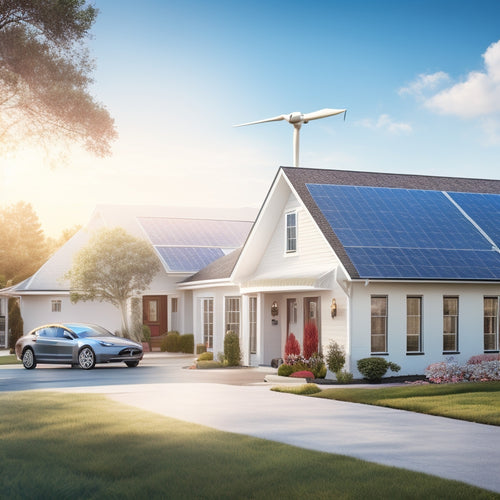
Financing Options for Home Solar Panels in CA
Share
As you consider financing options for home solar panels in California, you can tap into state incentives, such as rebates and tax credits, to reduce upfront costs to a large extent. You can also explore home equity loans, which offer fixed interest rates and flexible repayment terms. Additionally, solar leases and power purchase agreements provide affordable options with little to no upfront costs. Specialized financing companies, like Sunrun and Mosaic, offer competitive interest rates and innovative solutions. As you explore these options, you'll discover more opportunities to make going solar a cost-effective reality for your California home.
Key Takeaways
• California offers incentives like the California Solar Initiative (CSI) and state tax credits to reduce the cost of solar installations.
• Home equity loans and solar loans are financing options that provide a lump sum or fixed monthly payments with competitive interest rates.
• Solar panel lease agreements and power purchase agreements allow homeowners to rent or purchase electricity at a fixed rate with no upfront costs.
• Companies like Sunrun, Vivint Solar, and Trinity Solar offer solar loans, while startups like Mosaic, Dividend, and Sunlight Financial provide innovative financing solutions.
• Homeowners should evaluate financing options based on factors like interest rates, repayment terms, and customer service to find the best fit for their needs.
California State Incentives for Solar
California offers several state incentives for solar, including the California Solar Initiative (CSI), which provides rebates of up to $1.25 per watt for residential and commercial solar installations. You're probably thinking, 'That's a pretty sweet deal!' And you're right, it is.
But wait, there's more! California also offers a state tax credit of 5.5% of the total system cost, which can be claimed in addition to the federal tax credit. You'll be saving money in no time!
As a California resident, you're in luck. The Golden State is one of the most solar-friendly states in the country. With California rebates and state tax credits, going solar has never been more affordable.
You can expect to save thousands of dollars on your solar installation, making it an even more attractive option for your home. So, what're you waiting for? Take advantage of these amazing incentives and start harnessing the power of the sun today!
Home Equity Loan Financing Options
If you've exhausted California's state incentives, you can explore home equity loan financing options, which allow you to tap into your home's value to fund your solar panel installation.
This financing method is particularly appealing if you've built up significant equity in your home. With a home equity loan, you can borrow a lump sum of money using your home as collateral. The loan terms typically range from 5 to 15 years, with fixed interest rates that vary depending on your credit score and lender.
For example, you might secure a 10-year loan with a 4% interest rate, allowing you to spread the cost of your solar panel installation over a decade. Since home equity loans often have lower interest rates compared to personal loans or credit cards, they can be a cost-effective financing option.
However, keep in mind that you'll need to have sufficient equity in your home and a good credit score to qualify for a home equity loan. Be sure to shop around for the best interest rates and loan terms that fit your financial situation.
Solar Panel Lease Agreements
You can opt for a solar panel lease agreement, which allows you to rent solar panels from a provider and pay a fixed monthly fee to use them. This option is perfect for those who want to harness the power of solar energy without breaking the bank. With a lease agreement, you'll enjoy lease benefits like little to no upfront costs, and the provider will handle maintenance and repairs.
Flexible terms are a major perk of solar panel lease agreements. You can choose a lease period that fits your needs, usually ranging from 10 to 20 years. During this time, you'll pay a fixed monthly fee, which can be lower than your current electricity bill. Plus, you'll lock in a fixed rate for the lease term, protecting you from rising energy costs.
At the end of the lease, you can choose to renew, purchase the system, or have it removed. With a solar panel lease agreement, you'll be generating clean energy and saving money – it's a win-win!
Power Purchase Agreements Explained
Through power purchase agreements (PPAs), homeowners in California can finance their solar panel systems without upfront costs, effectively buying the electricity generated by the system at a fixed rate. You'll benefit from clean energy without shouldering the entire system cost.
Here's how it works: a third-party provider installs and maintains the solar panel system on your property, and you purchase the electricity it generates at a predetermined rate, usually lower than your current utility rate.
PPAs offer several benefits, including:
- Predictable energy costs: Lock in a fixed rate for the life of the agreement, shielding you from rising utility prices.
- Zero upfront costs: No initial investment required, making solar energy more accessible.
- Flexibility: Many PPAs come with contract flexibility, allowing you to adjust or terminate the agreement if needed.
With a PPA, you'll enjoy the perks of solar energy without the hefty upfront investment. It's a win-win: you'll save on energy costs, and the provider will maintain the system, ensuring peak performance.
California Solar Financing Companies
California homeowners looking to finance their solar panel systems have a range of options, including companies that specialize in providing solar financing solutions tailored to the state's unique market conditions. One popular option is solar loans, which allow you to borrow money to cover the upfront cost of solar panels and repay the loan through a series of fixed monthly payments. Companies like Sunrun, Vivint Solar, and Trinity Solar offer solar loans with competitive interest rates and flexible repayment terms.
In recent years, financing startups have emerged to disrupt the traditional solar financing landscape. Companies like Mosaic, Dividend, and Sunlight Financial offer innovative financing solutions that cater to homeowners with varying credit scores and financial backgrounds. These startups often partner with solar installers and manufacturers to provide financing options that are convenient, affordable, and hassle-free.
When evaluating California solar financing companies, consider factors like interest rates, repayment terms, and customer service. Be sure to read reviews, compare rates, and ask about any incentives or promotions that can help you save even more on your solar panel system.
Frequently Asked Questions
Can I Sell My Excess Solar Energy Back to the Grid?
"You're wondering if you can sell excess solar energy back to the grid? With Net Metering, you can! It's like energy trading - you produce, they buy, and your meter spins backward, crediting you for the excess energy you generate!"
How Long Does the Average Solar Panel System Last?
You're wondering how long your shiny new solar panel system will last? Typically, a well-maintained system can last 25-30 years, thanks to panel durability and regular system maintenance, ensuring you reap the benefits of clean energy for decades to come!
Are Solar Panels Resistant to Hail and Extreme Weather?
You're wondering if solar panels can withstand hail and extreme weather? They're built to last, with rigorous storm testing ensuring weather durability. In fact, most panels can withstand hail up to 1 inch in diameter at 50 mph!
Can I Install Solar Panels on a Rented Property?
You're wondering if you can install solar panels on a rented property? Well, you'll need landlord approval, but it's worth it - you'll benefit from reduced energy bills and a clear conscience, all while increasing the property's value!
Do Solar Panels Increase My Property's Insurance Cost?
You're wondering if solar panels will hike your property's insurance cost; the short answer is, it depends. Insurance premiums might increase, but adding policy riders can help mitigate the added risk, so don't sweat it just yet!
Related Posts
-

Top 10 DIY Conversion Kit Reviews and Tips
You're taking the first step towards electrifying your ride, and with the right DIY conversion kit, you'll be cruisin...
-

Why Homeowners Are Embracing DIY Energy Independence
By taking control of your energy needs, you're breaking free from the uncertainty of utility bills and embracing a se...
-

Planning for an Electric Vehicle-Friendly Urban Future
As you plan for an electric vehicle-friendly urban future, you'll need to integrate high-power charging stations, sma...


